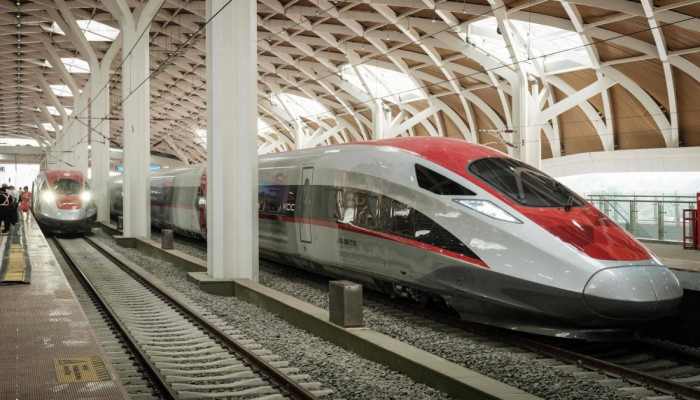Indonesia unveils China-backed 'Whoosh' high-speed railway
- In Reports
- 04:34 PM, Oct 03, 2023
- Myind Staff
Indonesian President Joko Widodo officially inaugurated the $7.3 billion high-speed railway linking the nation's capital with Bandung city. This railway, known as "Whoosh," stands as a China-backed endeavour and a crucial component of China's Belt and Road Initiative.
"The name is inspired by the sound of a rushing high-speed train," Mr Widodo told reporters at the launch.
Despite being a flagship infrastructure project for President Jokowi, the ambitious 142-kilometer (88.23-mile) high-speed railway has encountered a multitude of challenges along the way. These hurdles include issues with land procurement, pandemic-related delays, and a significant increase in project costs.
The project's launch on Monday comes significantly later than the initial target of having it operational by 2019. During the launch, President Jokowi explained that the name "Whoosh" was inspired by the sound of a high-speed train in motion. The train's maximum operating speed could reach 350 kilometers per hour (217 mph), representing a significant step in the modernization of mass transportation that is environmentally friendly, he emphasized.
Luhut Pandjaitan, a senior minister overseeing the project, announced during the launch that the ongoing free trial rides on the bullet train, which commenced in the second week of September, would be extended. Ticket prices are set to be implemented in mid-October. The high-speed railway was constructed by a consortium of Indonesian and Chinese companies.
Indonesian officials expressed optimism about the high-speed railway's potential to enhance economic productivity. They highlighted the trains' electric power source as a means to reduce the nation's carbon footprint.
Bandung, situated in West Java province, is often likened to Indonesia's version of Silicon Valley. The bullet train's remarkable speed primarily caters to the needs of business travelers and tourists, as noted by Dedi Dinarto, the lead Indonesia analyst at the strategic advisory firm Global Counsel.
"It raises uncertainty about whether this substantial infrastructure investment, funded both by China and the national budget, will prove profitable for the government," he said.
Ticket prices for the train are yet to be determined, but the train's operators estimate a one-way fare could range from 250,000 to 350,000 Indonesian rupiah ($16 to $22.60). In contrast, a shuttle bus ride can cost as little as $5 (approximately 77,685 Indonesian rupiah), which is significantly more affordable for the average citizen.
"It's so expensive," a woman living nearby told the BBC. "There are other transport options with comparable prices. I'd rather take a normal train or a bus."
"Hopefully many would actually choose to use it because otherwise, it would be a waste after all the finances poured into it as well as the challenges faced in building it," she added to BBC Indonesian.
Critics express concerns about the project's significant cost burden on Indonesia's already strained public finances, exacerbated by the pandemic. To combat delays, President Jokowi agreed to allocate state funds. The project aligns with Chinese President Xi Jinping's Belt and Road initiative, a decade-old plan aiming to promote connectivity between Asia, Africa, and Europe through infrastructure investments. Indonesia, Southeast Asia's largest economy, actively seeks investments from China, its leading trade partner.
Image source: VOA News







Comments